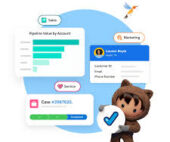“You don’t have to sell people on the potential. What you do have to sell people on is how do we go about it.”
— Deep Srivastav, Data Leadership Collaborative
Developing an Effective AI Strategy: A Seven-Step Framework
A well-defined AI strategy is the foundation for success. It provides clarity on vision, purpose, and goals while ensuring teams understand the steps needed to get there. By adopting a data-driven approach with measurable objectives and key performance indicators (KPIs), businesses can foster seamless collaboration and maximize AI’s impact.
Key Steps to Building a Successful AI Strategy
1. Define Clear Business Objectives
Start by aligning AI initiatives with overarching business goals. Clearly outline what success looks like and identify areas where AI can drive the most value.
2. Assess Your Data Readiness
Evaluate the quality, quantity, and accessibility of your data. Identify gaps that could impact AI performance and ensure you have a strong data foundation for accurate insights.
3. Identify and Prioritize AI Use Cases
Determine which business processes can benefit from AI, balancing short-term wins with long-term strategic projects. Focus on use cases that align with your objectives and offer the highest return on investment.
4. Build a Multidisciplinary Team
AI success requires expertise across multiple domains. Assemble a team that includes data scientists, business strategists, engineers, and ethics specialists to guide AI development and deployment.
5. Choose the Right AI Technologies
Select AI tools and platforms that match your business needs. Consider scalability, security, integration capabilities, and ease of deployment when evaluating your technology stack.
6. Pilot with Proof-of-Concept Projects
Start small by running controlled pilot projects to test feasibility, validate assumptions, and refine your approach. This minimizes risk while providing valuable insights before scaling AI across the organization.
7. Monitor, Evaluate, and Improve
AI is not a one-time implementation—it requires continuous monitoring and refinement. Track performance, gather stakeholder feedback, and iterate based on data-driven insights to optimize outcomes.
Key Considerations for AI Implementation
✅ Ethical AI & Bias Mitigation
Establish guidelines to ensure AI operates fairly, transparently, and responsibly, addressing potential biases and privacy concerns.
✅ Change Management & Stakeholder Buy-in
Effectively communicate AI’s role within the organization, ensuring employees understand its benefits and adapt to new workflows.
✅ Security & Compliance
Implement robust security measures to safeguard data and adhere to industry regulations, ensuring responsible AI adoption.
By following these steps, organizations can create an AI strategy that not only drives innovation but also delivers measurable business impact while mitigating risks. The key to AI success isn’t just recognizing its potential—it’s about executing it the right way.












